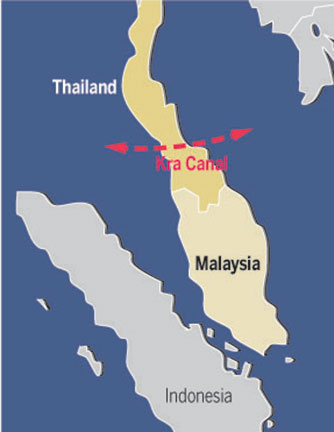Grand canal is a vision of the future
By David Gosset (China Daily) Updated: 2015-08-24 09:49
 |
Even if incidents caused by the ethnic and religious insurgency in the Patani region in the three southernmost provinces of Thailand do not prevent 3 million tourists every year from enjoying Phuket, which is also located in the south of the country, some observers still argue that it would be too risky to invest in a massive project in a zone where tensions may erupt. But was Egypt a model of stability under Ismail the Magnificent (1830-1895)? The largest public engineering work of the 19th century was realized despite the significant risks, and over the years the 193 km long Suez Canal has positively modified the map of global trade and largely benefited Egypt. It now generates about $5 billion a year in revenue for the country.
When opponents of the Kra Canal say that if it is such a good idea it would already have been built, they seem to be unaware that new factors have created an entirely new situation: the 21st century Chinese return to centrality accompanied by the great leap outward of global China provides the means and the need to realize the Kra dream now.
Working with Thailand, China, which built the 1,776 km Grand Canal 1,300 years ago, obviously has a key role to play in the realization of a new trade nexus but it would be in the interests of both countries to remain open to other sources of investment and expertise.
When in the 17th century, during the reign of Louis XIV (1638-1715), Pierre-Paul Riquet began building the Canal du Midi, King Narai (1633-1688) asked the French engineer De Lamar to look for the first time into the feasibility of the Kra Canal.
Two centuries later, the father of the Suez Canal himself, French diplomat and entrepreneur Ferdinand de Lesseps, visited the Rattanakos in Kingdom and expressed his support for the project.
Preoccupied by the problems he encountered with the Suez Canal, Ferdinand de Lesseps was never able to really focus on a new Asian enterprise. More importantly, Chulalongkorn, Rama V (1853-1910), who had to neutralize French ambitions in Indochina by using the British Empire in order to maintain the independence of his country, could not antagonize the British by challenging their interests in Singapore, the outpost that Thomas Stamford Raffles had created seven decades earlier.
An inclusive enterprise, the long-term success of the Kra Canal will also be largely determined by the governance of its operations, and in that matter Bangkok can find inspiration from the Suez Canal Authority or the Panama Canal Authority. It should also be ready to create a governing structure that takes account of contemporary local, regional and international dynamics.
Misconceptions about the nature of China's re-emergence have produced the "China threat" discourse, and those who cultivate this narrative or those who simply believe it will misinterpret Beijing's involvement in the Kra Canal as a threatening projection of Chinese power. One can expect that the United States will first use its diplomatic influence and its soft power to oppose the canal as much as, at some point, the United Kingdom of Queen Victoria tried to oppose the French initiative in Suez. However, we must not forget that in a spirit of openness and inclusiveness Ferdinand de Lesseps was finally able to gain London's support.
Following open debate and convincing explanations on the collective benefits of the Kra Canal, the US will have to recognize that in an evolving world new initiatives that do not come from the West are not necessarily anti-Western. They are simply the mark of a multipolar world.
The author is director of the Academia Sinica Europaea at CEIBS and founder of the Euro-China Forum. He has established the New Silk Road Initiative. The views do not necessarily reflect those of China Daily.
- Lenders ordered to give green light to key national projects
- Intl investment fair to focus on Belt and Road
- China holds forum on China-Pakistan Economic Corridor
- Information, knowledge exchange needed under Belt and Road Initiative: Lithuanian expert
- ASEAN Community to give impetus to Belt and Road Initiative: Chinese FM
- 2015 China International Fair for Investment and Trade kicks off in Xiamen
- China's commodity imports robust in Jan-Aug period
- China stocks rebound 2.92%
- 2015 China box office already past 2014 total
- China foreign trade decline widens in August
- Interview: JP Morgan's senior executive bullish on China
- Innovation, development the focus for NZ mayors
- Lives of freelancers

















